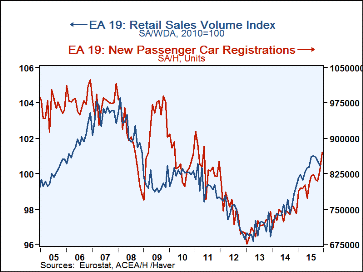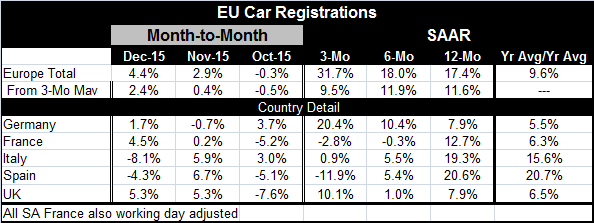 Global| Jan 15 2016
Global| Jan 15 2016Car Registrations in Europe Take Wing
Summary
Not even the well-publicized problems of Volkswagen could hold back European car buyers at yearend. Europe-wide registrations grew by 4.4% in December, capping a year in which registrations soared by 17.4%. On a three-month smoothed [...]
 Not even the well-publicized problems of Volkswagen could hold back European car buyers at yearend. Europe-wide registrations grew by 4.4% in December, capping a year in which registrations soared by 17.4%. On a three-month smoothed basis, sales still advanced in double-digits by 11.6%. As the year draws to a close, auto registrations are pulling ahead of retail sales which had been running a bit stronger and have finally hit some sort of plateau. It is hard to judge the heath of Europe's economy from autos since auto registrations have been one of the strongest parts since 2012. Whatever the contribution of vehicle sales to overall growth, that is continuing as 2015 ends and 2016 begins.
Not even the well-publicized problems of Volkswagen could hold back European car buyers at yearend. Europe-wide registrations grew by 4.4% in December, capping a year in which registrations soared by 17.4%. On a three-month smoothed basis, sales still advanced in double-digits by 11.6%. As the year draws to a close, auto registrations are pulling ahead of retail sales which had been running a bit stronger and have finally hit some sort of plateau. It is hard to judge the heath of Europe's economy from autos since auto registrations have been one of the strongest parts since 2012. Whatever the contribution of vehicle sales to overall growth, that is continuing as 2015 ends and 2016 begins.
The outlook, of course, is still clouded by problems at Volkswagen. There is also a new scandal for autos in which Chrysler and Fiat are accused of inflating U.S. car sales. Clearly, the sector has some hurdles to go over to restore public trust. However, surprisingly, at yearend with the bulk of the disclosed allegations at VW on the table, sales did not just stand up; they accelerated.
In December, registrations rose strongly in the U.K. (5.3%), in France (4.5%) and in Germany (1.7). December registrations were lower on balance in Spain (-4.3%) and in Italy (-8.1%). There was some evidence of unevenness as over three months registrations were net lower in France and Spain while over six months they edged lower in France. But over 12 months sales were simply strong everywhere. Germany and the U.K. each fell short of double-digit registration gains with rise of 7.9%. In France, registrations soared by 12.7%. Italian registrations were up by 19.3% over 12 months while Spain led the way for the year with a gain of 20.6%.
Auto registrations are the high point for 2015 as data for the year begin to finalize. But Europe continues to have its issues to deal with as well. The euro area trade surplus was up in November but helped by falling imports which are a sign of weakening domestic demand. Of course, stock markets are upside down again as oil has fallen. OPEC countries today announced that they are now selling oil an average price of $25 per barrel, the price of a cheap haircut. EMU-wide inflation continues to undershoot. Recently, released notes from the last ECB meeting reveal that the ECB governors were willing to do more but also cautious about side effects.
While surging auto sales are a good sign and give a feel-good tone to the end of the year, this has been the Cinderella sector for several years running. Its performance is good news but not really `new' news. Europe remains mired in swamp of difficulties and its pace of progress still appears to be slow. The auto sector continues to be just about the lone bright spot.

Robert Brusca
AuthorMore in Author Profile »Robert A. Brusca is Chief Economist of Fact and Opinion Economics, a consulting firm he founded in Manhattan. He has been an economist on Wall Street for over 25 years. He has visited central banking and large institutional clients in over 30 countries in his career as an economist. Mr. Brusca was a Divisional Research Chief at the Federal Reserve Bank of NY (Chief of the International Financial markets Division), a Fed Watcher at Irving Trust and Chief Economist at Nikko Securities International. He is widely quoted and appears in various media. Mr. Brusca holds an MA and Ph.D. in economics from Michigan State University and a BA in Economics from the University of Michigan. His research pursues his strong interests in non aligned policy economics as well as international economics. FAO Economics’ research targets investors to assist them in making better investment decisions in stocks, bonds and in a variety of international assets. The company does not manage money and has no conflicts in giving economic advice.
More Economy in Brief
 Global| Feb 05 2026
Global| Feb 05 2026Charts of the Week: Balanced Policy, Resilient Data and AI Narratives
by:Andrew Cates






